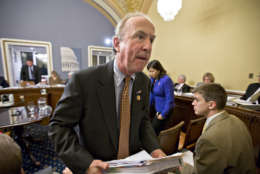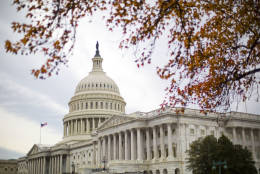Government Shutdown
-
President Donald Trump voices his displeasure over the $1 trillion budget deal for the remainder of Fiscal Year 2017 and suggests a shutdown might be in order if the 2018 elections don't favor Republicans.
May 02, 2017 -
When it comes to government shutdowns, remember that every silver lining has a cloud, says Senior Correspondent Mike Causey.
April 28, 2017 -
Republicans say they will push a short-term spending bill keeping the government open through the House on Friday with only GOP votes, if necessary
April 27, 2017 -
In today's Top Federal Headlines, the chair of the House Appropriations Committee has brought forth a short term continuing resolution to delay a government shutdown.
April 27, 2017 -
The threat of yet another partial government shutdown has been with us all week and some federal workers are telling Senior Correspondent Mike Causey to bring it on.
April 27, 2017 -
Republicans controlling the House have unveiled a stopgap bill to keep the government open past a shutdown deadline of midnight Friday.
April 26, 2017 -
A federal employment attorney says it's outrageous the government is treating its federal workforce like this.
April 26, 2017 -
Hope this doesn't wreck your morning, but at 11:59 p.m. this Friday, civilization as Washington knows it may come to an end, says Senior Correspondent Mike Causey. The government might shut down.
April 26, 2017 -
Are you planning for your next job? If not, tune in to this week's Your Turn when host Mike Causey speaks with Nancy Segal, an expert in finding work in the 21st century. Segal will discuss career planning, resume writing and how to use social media to get a job and get ahead. April 26, 2017
April 25, 2017 -
The White House says it won't happen, but the Office of Management and Budget is asking that agencies prepare to prepare for a government shutdown. Here are four things to remember about your pay, benefits, work status and others if Congress can't agree on a plan to keep the government running past Friday.
April 25, 2017 -
Want to know if you'll be going to work if the government isn't funded? We'll tell you here.
April 25, 2017 -
All the pressure is on Congress this week as it deals with a Friday funding deadline. David Hawkings, senior editor at Roll Call, tells Federal Drive with Tom Temin that shutdown worries are overblown. It's next year we should be worrying about.
April 25, 2017 -
In today's Top Federal Headlines, a pair of Virginia congressmen has introduced legislation to continue paying federal employees in preparation for a possible government shutdown.
April 25, 2017 -
While the looming federal shutdown may be big news inside the Beltway, Senior Correspondent Mike Causey says that it's probably not going to be mentioned in next week's People magazine.
April 25, 2017 -
Press Secretary Sean Spicer said April 24 that the work by Mick Mulvaney, the director of the Office of Management and Budget, and others has been “very positive” and a shutdown is unlikely.
April 24, 2017















